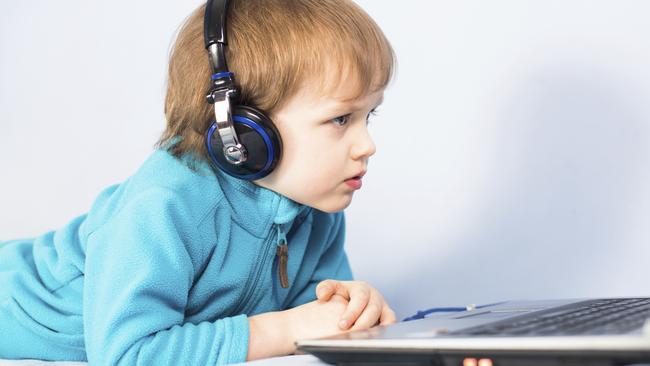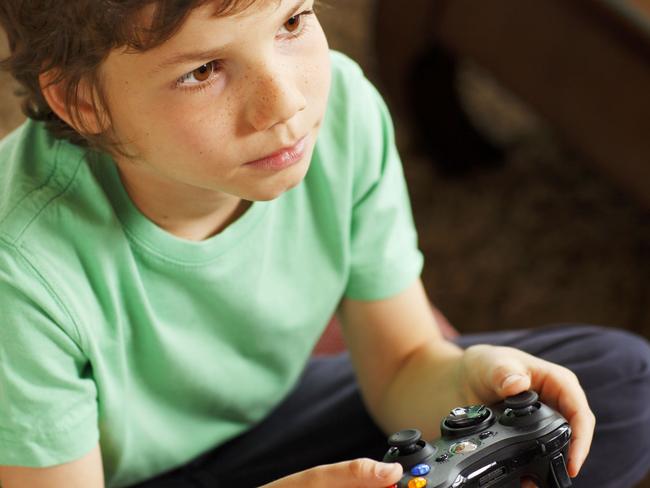Screen time warning: the bad habit driving increasing rates of childhood anxiety, aggression
Parents are being urged to avoid using screens as a quick fix to combat toddler tantrums, with new research linking excessive screen time to increased rates of anxiety, depression and aggression.

Victoria
Don't miss out on the headlines from Victoria. Followed categories will be added to My News.
Parents might want to think twice before using mobile devices to quickly soothe toddlers, after new research found this practice could be contributing to a ‘vicious cycle’ of behavioural issues.
Children who turn to screens as a coping mechanism could be heightening their risk of developing aggression, anxiety, depression and attention difficulties, an Australian Catholic University study suggests.
The analysis of 117 studies covering 292,000 children globally, aged from birth to 10, revealed excessive screen time was increasing children’s chances of developing social and emotional problems, with video games the main culprit.

ACU Institute for Positive Psychology and Education PhD candidate Roberta Vasconcellos said school-aged children were particularly vulnerable, as they were more likely to exceed screen time guidelines and rely on screens to manage hyperactivity and other emotional challenges.
“Children who are already struggling with emotional or social issues tend to resort to screens as a way to cope or escape,” she said.
“For example video games are really engaging. They might (tell the user) ‘you look good, you’re great, you’re awesome’ and that makes the child feel like they’re really good at something.
“Children may find screens help them deal with those distressing feelings but that’s when the problem occurs because it might be some kind of short-term relief, but over time it can trap them in a cycle that will reinforce their difficulties and delay their development.”
The research found girls were more susceptible to developing socio-emotional problems with greater screen use, while boys were more likely to resort to screens as a way to cope with socio-emotional challenges.
University of Queensland Associate Professor Michael Noetel, who supervised the research, said excessive screen use of any kind could lead to behavioural challenges as it took time away from sleep, exercise and social interactions.
“Our study shows screen use is a vicious cycle: we sometimes give children screens when they’re struggling, but doing so seems to make them struggle more,” he said.
“The problem is screens get in the way of learning, sleep, play and social connections that underpin healthy development.”

The research stressed the need for an urgent review of screen time guidelines.
Currently, the Australian Institute of Family Studies guidelines recommended no screen time for children younger than two and no more than one hour per day for children aged two to five years.
This was increased to no more than two hours of sedentary recreational screen time per day for children and young people aged five to 17 years – not including school work.
“We need to have more recommendations in terms of good quality content,” Ms Vasconcellos said.
“The algorithms are there and we need to be very careful because one video leads to another one. The kids are not choosing what to watch, they are being offered age inappropriate content all the time so we need to monitor their screens.”
As for ways parents could prevent children from falling victim to the “vicious” screen time cycle, Ms Vasconcellos suggested families make time to play video games or watch videos together so their child was still engaging in face-to-face bonding.
“You can also provide them with a tablet that has YouTube kids only – or it doesn’t have any video apps at all – as well as having parental controls,” she said.
Other tips included emphasising the importance of making real-life friends, creating off-screen experiences based on a game and limiting what apps or games children were allowed to engage with.
“Every time your child is seeking more and more (screen time), it’s crucial to talk to them and understand what they’re struggling with because sometimes they just need emotional support and guidance,” Ms Vasconcellos said.
More Coverage
Originally published as Screen time warning: the bad habit driving increasing rates of childhood anxiety, aggression





